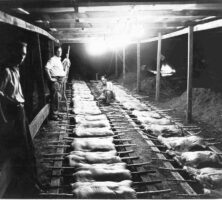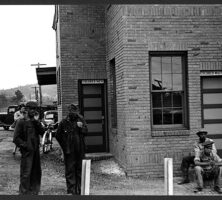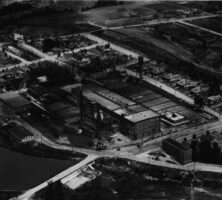Located in west central Georgia, about seventy-five miles southwest of Atlanta and forty miles northeast of Columbus, Manchester sits at the intersection of Georgia 85 and U.S. 27 in the southern tip of Meriwether County. According to the 2020 U.S. census, Manchester has a population of 3,584, making it the largest city in the county.
Named for the industrial city in England, Manchester was incorporated in 1909. The planned city had come into existence in 1907 when the Atlanta, Birmingham, and Atlantic (AB&A) Railroad chose the site as the junction of its main rail lines to Atlanta and Birmingham, Alabama, and built extensive rail yards and shops there. Fuller E. Callaway, an industrialist in nearby LaGrange, soon announced he would build a textile mill in the new town. Callaway and others had lobbied to get the AB&A into west Georgia and LaGrange to give the long-established Atlanta and West Point railroad competition in hauling freight. By 1909 the Manchester plant of Callaway Mills opened and began producing textile products. In the 1960s Milliken bought the plant, which was a major employer in the area until it closed in 1985.

Prior to 1907, only a few homes stood in the area. The Manchester Development Company, with Callaway as its treasurer, was organized to sell building lots for $75 each to prospective residents. By 1912, just three years after incorporation, Manchester had become the largest city in the county, with new homes, businesses, and schools under construction.
Recreational facilities were soon developed and operated originally by the YMCA and later the Callaway Educational Association. Churches were also established. Callaway Mills provided a union church for all denominations, and soon after its establishment, Baptist, Methodist, and Presbyterian churches sprung up. Other denominations followed.
The city’s two earliest schools were private. To accommodate the growing population, Manchester established a public school system. Those schools are now part of the Meriwether County School System. The Pine Mountain Regional Library has its headquarters in Manchester with a branch in Greenville, the county seat.
Manchester lies just four miles southeast of Warm Springs, famous for its rehabilitation center and its frequent guest Franklin D. Roosevelt, who sought treatment for his polio there. Roosevelt’s visits often brought him to Manchester. On the evening of October 2, 1928, he was speaking to a group there when New York Democrats tried to reach him by telephone to ask him to run for governor of New York, his home state, which he ultimately agreed to do. He won that post, and four years later, he was elected president of the United States.

Popular fiction writer Stuart Woods is one of Manchester’s most famous sons. His maternal grandfather, William Henry Callaway, served as chief of police in the 1910s and 1920s. Woods left Meriwether County after attending public schools and set his first novel, Chiefs (1981), in the fictionalized town of Delano, which shares many similarities with his hometown of Manchester. The Mystery Writers of America awarded Chiefs its Edgar Allen Poe Award in 1982 for best first novel.











